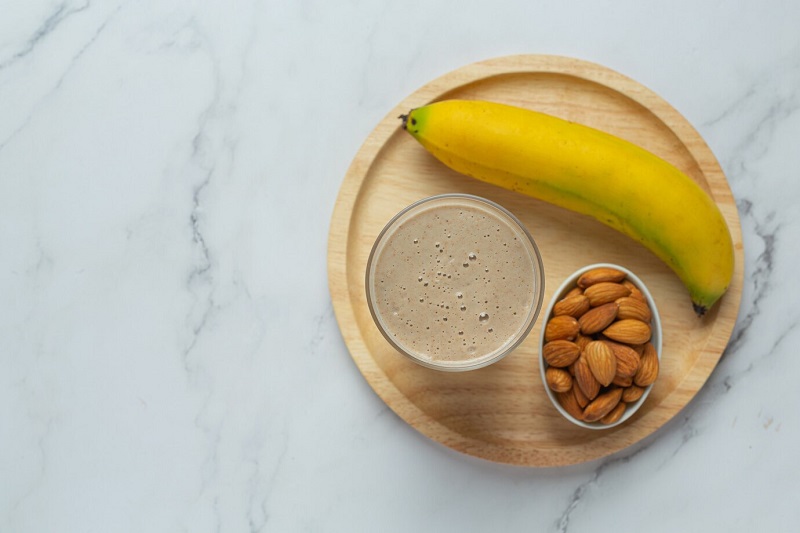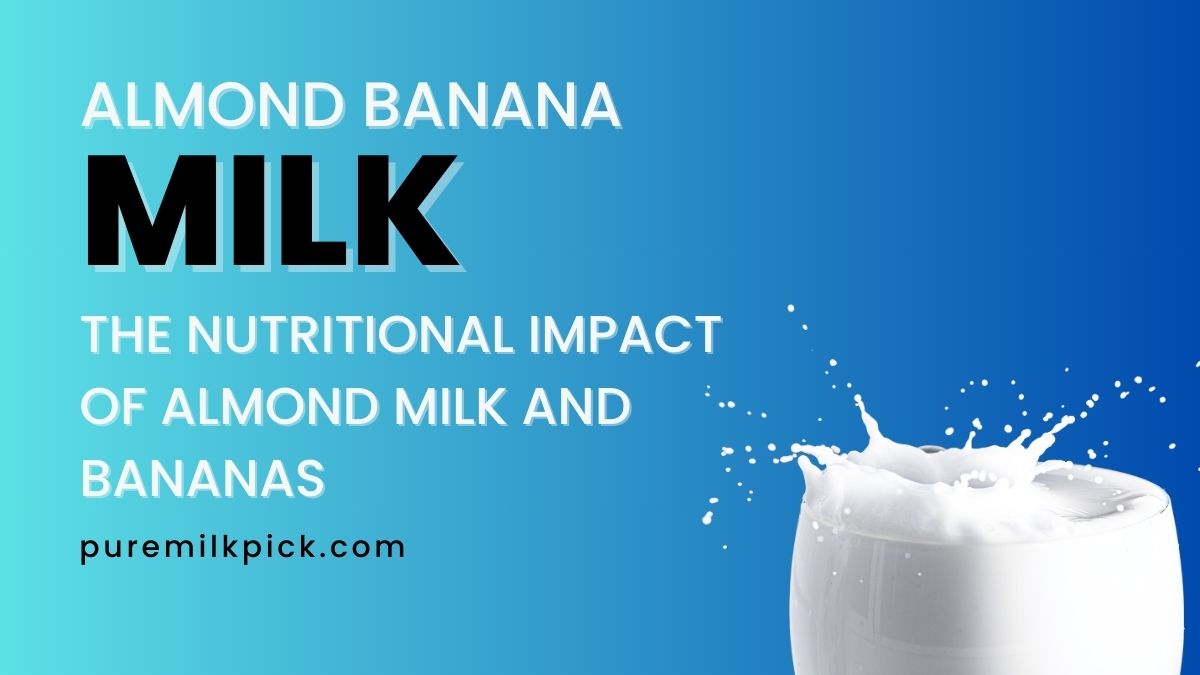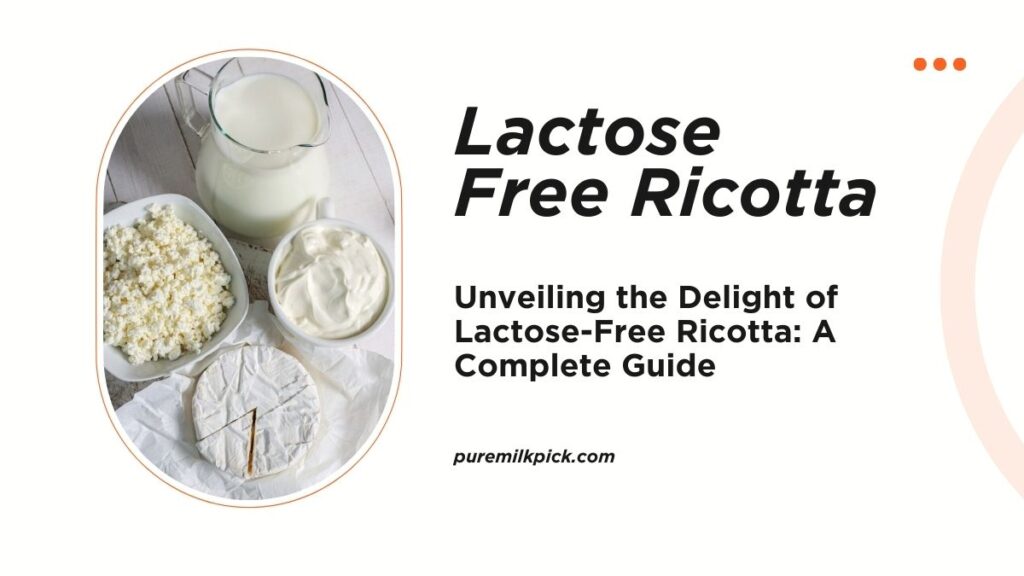Almond milk and bananas, when combined, form a nutrient-rich duo that is hard to match. Almond milk, a popular plant-based milk alternative, is naturally lactose-free and packed with vitamins like E and D. It’s also a good source of calcium, making it a nutritious option for those avoiding dairy. Bananas, on the other hand, are high in potassium, vitamin B6, and vitamin C, constituting an excellent source of energy and antioxidants.
The combination of almond milk and banana isn’t just nutritionally beneficial; it’s also incredibly versatile. You can enjoy it plainly as a refreshing, dairy-free smoothie or incorporate it into your breakfast cereal or oats. It’s also an excellent base for whipping up protein shakes or even as an ingredient in desserts like banana bread or pancakes.
However, the benefits and uses of almond milk bananas go far beyond just their consumption. In the subsequent sections, we will delve further into the wide range of health benefits this duo can offer, from promoting heart health to aiding in weight management. We will also explore more creative ways to incorporate this combination into your daily diet. Stay tuned.
What is almond milk?
Almond milk is a plant-based alternative to traditional dairy milk. It’s made by grinding almonds, mixing them with water, and then straining the mixture to remove the solids. The result is a smooth, creamy liquid that retains the mild, nutty flavor of almonds.
Nutritional composition: vitamins, minerals, and antioxidants
Almond milk is a nutritional powerhouse, rich in several essential vitamins, minerals, and antioxidants. It is high in vitamin E, a powerful antioxidant that helps protect the body against free radicals, vitamin D, which is crucial for bone health, and calcium, which is often fortified in almond milk. Almond milk also contains a good amount of potassium and magnesium, minerals that are important for heart health.
Health benefits of almond milk, including its role in promoting heart health, supporting bone strength, and aiding in weight management
Almond milk offers numerous health benefits. Its low calorie and low sugar content make it a healthy choice for those looking to manage their weight. The high amount of vitamin E present in almond milk aids in maintaining skin health, while the calcium and vitamin D fortification support bone strength. The monounsaturated fats in almond milk can help reduce the levels of harmful LDL cholesterol and raise the levels of beneficial HDL cholesterol, thus promoting heart health. Finally, being lactose-free, it’s a great option for those who are lactose intolerant or seeking a plant-based milk substitute.
Read More: Experience Health & Sustainability with Beber Almond Milk
Exploring the Nutritional Powerhouse: Bananas
Bananas are a highly nutritious fruit, known for their high energy content and rich assortment of vitamins and minerals. They come in various sizes, colors, and firmness, but they are typically elongated and curved, with a soft flesh covered by a peel that can range from green (when unripe) to yellow (when ripe).
Overview of bananas: nutritional content and varieties
A medium-sized banana (about 118 grams) is an excellent source of several key nutrients. It contains approximately 105 calories, making it a great energy source. Furthermore, bananas are rich in dietary fiber, which aids digestive health, and are high in potassium, a mineral that helps regulate heart function and maintain fluid balance. Other essential nutrients found in bananas include vitamin C, vitamin B6, and magnesium.
As for variety, the most commonly known and consumed banana is the Cavendish, which is the yellow variety that is typically found in supermarkets. However, other varieties like red bananas, apple bananas, and finger bananas, each with their unique taste and texture, offer a delightful variety to the palette.
Health benefits of bananas, such as potassium, fiber, and vitamins
The health benefits of bananas are numerous. The high potassium content is beneficial for heart health, as it helps control blood pressure and reduces the risk of stroke. The dietary fiber in bananas aids in digestion and contributes to feelings of satiety, thus helping with weight management. Moreover, bananas contain several types of potent antioxidants, including dopamine and vitamin C, which can reduce inflammation and oxidative stress.
How bananas contribute to a balanced diet and overall well-being
Incorporating bananas into your diet can contribute to overall well-being. Their natural sweetness makes them a great alternative to sugar-laden snacks. Due to their high fiber content and low glycemic index, bananas can help control blood sugar levels and support gut health. Additionally, the vitamin B6 in bananas plays a crucial role in brain development and function, while their magnesium content can assist with mood regulation and stress relief. All these factors make bananas not just a tasty but a healthy addition to your daily diet.

The Synergy of Almond Milk and Bananas
When you combine almond milk and bananas, you get more than just a delicious snack. This duo synergizes to provide a nutritionally balanced meal option that is not only satisfying but also boosts your overall health.
Benefits of Combining Almond Milk and Bananas in a Diet
Combining almond milk with bananas forms a nutrient-dense, easily digestible powerhouse meal. The potassium from bananas pairs well with the calcium and vitamin D from almond milk, promoting bone health. Plus, the dietary fiber from both helps manage your appetite by promoting feelings of fullness. The blend is also high in antioxidants, beneficial for reducing oxidative stress and inflammation in the body.
How the Duo Complements Each Other Nutritionally
Almond milk and bananas complement each other nutritionally in several ways. The protein and healthy fats in almond milk can slow the absorption of sugar from bananas into your bloodstream, thereby preventing glucose spikes. Additionally, the fiber in bananas can help enhance the gut health benefits of almond milk, aiding digestion.
Recipes Showcasing the Combination of Almond Milk and Bananas
There are countless ways to enjoy the combination of almond milk and bananas. For a quick and nutritious breakfast, blend them into a smoothie with a touch of honey or a scoop of protein powder. You can also pour almond milk over sliced bananas and top with granola for a satisfying breakfast bowl. For a comforting dessert, try baking a banana almond milk pudding or a dairy-free banana bread. The options are endless, proving that this dynamic duo can be a part of any meal.
Almond Milk Banana in Everyday Life
Incorporating Almond Milk Banana into a Daily Routine
Incorporating almond milk and bananas into your daily routine is a simple and flexible way to boost your nutrient intake. You can start your day with a banana and almond milk smoothie, or use them as a base for your oatmeal. For a midday snack, try blending almond milk, a frozen banana, and a spoonful of nut butter for a creamy, satisfying treat. You can even use this combination as a dairy substitute in baking or cooking, adding richness and flavor to your recipes.
Creative Ways to Use Almond Milk Banana in Cooking and Baking
Almond milk and banana can bring a creative twist to your regular recipes. You can use them to make a dairy-free banana ice cream or blend them with cocoa for a healthy chocolate pudding. In baking, mashed banana and almond milk can serve as a vegan-friendly substitute for eggs and dairy milk. Try experimenting with recipes such as banana bread, pancakes, or muffins.
Tips for Individuals with Dietary Restrictions on Utilizing Almond Milk Banana
For individuals with dietary restrictions such as veganism or lactose intolerance, the combination of almond milk and banana can offer a nutritious and delicious alternative to dairy. Almond milk banana smoothie can serve as a filling breakfast or snack. When baking, mashed bananas can replace eggs, and almond milk can be used in place of dairy milk. Moreover, almond milk banana ice cream can be a delightful dessert that fits within these dietary restrictions. Always ensure to choose unsweetened almond milk to avoid added sugars.

Addressing Common Myths and Concerns
Debunking myths surrounding almond milk and bananas
There are common misunderstandings about bananas and almond milk that can discourage their consumption. For instance, a prevalent myth is that bananas lead to weight gain due to their high sugar content. However, the fiber in bananas can actually aid digestion and promote a feeling of fullness, which can help with weight management. Similarly, almond milk is sometimes mischaracterized as being nutritionally inferior to cow’s milk. While it’s true that almond milk contains less protein, it’s rich in several vital nutrients like vitamin E and calcium, especially when fortified.
Addressing concerns related to sugar content, allergies, and nutritional misconceptions
While bananas do contain sugar, they are also packed with essential nutrients and fiber, making them a far healthier choice than processed snacks. As for almond milk, it is important to choose unsweetened versions to avoid added sugars. Those with tree nut allergies should avoid almond milk but can opt for other non-dairy alternatives like soy or oat milk. When comparing nutritional values, remember that both bananas and almond milk contribute beneficial elements to your diet. Their advantages should be considered in the context of a well-rounded and balanced diet.
Providing evidence-based information to clarify misconceptions
Research shows that bananas, due to their high fiber and nutrient content, can aid in digestion, heart health, and weight management. Almond milk, on the other hand, serves as an excellent dairy alternative, offering a wealth of nutritional benefits, including high amounts of calcium and vitamin E. Always refer to reliable and research-backed sources when navigating nutritional information to ensure you are accurately informed.
Sustainability and Ethical Considerations
Sustainability of Almond Milk Production and Its Impact on the Environment
Almond milk production is often scrutinized for its environmental impact. It requires significant water resources, with approximately one gallon of water needed to grow a single almond. Furthermore, almond cultivation is concentrated in California, where water scarcity is a pressing issue. On the positive side, almond milk generates fewer greenhouse gases than dairy milk. To make more sustainable choices, consumers can look for brands that prioritize water management strategies and support sustainable farming practices.
Ethical Considerations Related to Banana Cultivation and Fair Trade Practices
Banana cultivation, particularly in developing countries, often involves issues related to fair wages and working conditions. Additionally, conventional banana farming uses large amounts of pesticides, which can impact local ecosystems. To address these ethical concerns, consumers can seek out bananas certified by Fairtrade or Rainforest Alliance, indicating that the farmers are paid a fair wage and the farming practices are more environmentally friendly.
Suggestions for Making Environmentally Conscious Choices When Purchasing Almond Milk and Bananas
Being environmentally conscious when purchasing almond milk and bananas often involves a little extra effort. Look for almond milk from brands that have robust sustainability initiatives. When buying bananas, consider those with a Fairtrade or Rainforest Alliance label. Local farmer’s markets can also be a good source of sustainably grown produce. Always remember that every small choice can contribute to a larger impact on our planet’s health.
Conclusion
Incorporating almond milk and bananas into your diet can offer a host of nutritional benefits. These versatile ingredients can be creatively used in a variety of recipes, fulfilling dietary restrictions and offering a delicious alternative to dairy. While there are misconceptions surrounding their nutritional value, it’s important to understand the nutritional advantages they bring to a balanced diet.
At the same time, consideration of the environmental and ethical implications of the production of these items should not be overlooked. From the water-intensive cultivation of almonds to the fair trade concerns in banana farming, making mindful choices can make a significant difference. Look for almond milk brands that prioritize sustainable farming and opt for bananas bearing certified labels to ensure ethical farming practices.
Almond milk and bananas are not just nutritious; they are a testament to the complexity and interconnectedness of our food systems. As consumers, we have the power to make choices that not only benefit our health but also have a positive impact on the environment and society. Let’s use this power wisely, embracing both the nutritional benefits and the ethical considerations these foods bring to our tables.
Frequently Asked Questions
Yes, both bananas and almond milk have numerous health benefits. Bananas are a good source of dietary fiber, potassium, and vitamin C. Almond milk, especially when fortified, is rich in calcium and vitamin E. However, always opt for unsweetened almond milk to avoid added sugars.
Producing almond milk and bananas can have significant environmental impacts. Almond milk production requires substantial water resources, and the majority of it occurs in water-scarce regions. Banana farming, particularly in developing countries, frequently involves extensive pesticide use, which can harm local ecosystems.
When purchasing almond milk, look for brands that prioritize water management strategies and sustainable farming practices. For bananas, seek out those certified by Fairtrade or Rainforest Alliance, indicating that the farmers receive fair wages and use environmentally friendly farming practices.



